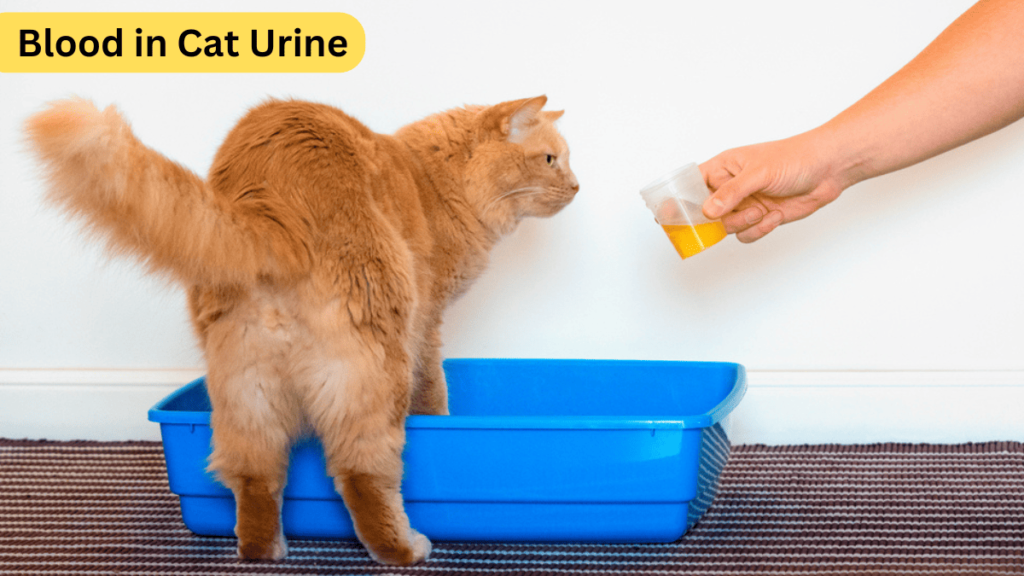
Discovering blood in your cat’s urine is alarming, and understanding the best course of action is essential for pet owners. Whether it’s a urinary tract infection, bladder stones, or feline idiopathic cystitis, timely intervention can make all the difference in your cat’s recovery and comfort. This guide provides everything you need to know about blood in cat urine treatment, including home treatments, when to seek veterinary help, and preventive measures.
Table of Contents
Understanding Hematuria in Cats

Hematuria, or blood in the urine, occurs when red blood cells are present in the urine, often giving it a pink or red hue. This condition can be caused by various issues, some minor and others more serious, such as a urinary blockage. Identifying and addressing the cause promptly helps improve outcomes for your pet.
Symptoms of Hematuria
In addition to visible blood in the urine, watch for these signs in your cat, as they may indicate a more serious underlying issue:
- Frequent urination in small amounts
- Straining or difficulty urinating
- Urination outside the litter box
- Pain or vocalizing when urinating
- Increased thirst
- Licking of the lower abdomen or genitals
Common Causes of Blood in Cat Urine
- Urinary Tract Infection (UTI)
A UTI is often caused by bacteria in the bladder, which can lead to inflammation and bleeding. Symptoms include frequent urination, straining, and blood in the urine. - Bladder Stones
Bladder stones form from mineral deposits in the urine, which can irritate the bladder wall and lead to bleeding. Stones vary in size and type, with treatment depending on the stone’s composition. - Feline Idiopathic Cystitis (FIC)
FIC is the leading cause of hematuria in cats and is often stress-related. It causes inflammation in the bladder, which can wax and wane in response to environmental changes. - Urinary Obstruction
Urinary obstruction is a life-threatening condition, primarily in male cats, where stones or plugs block urine flow. Immediate veterinary intervention is critical. - Trauma
Injury to the urinary tract, often from a fall or accident, can lead to hematuria. - Tumors or Cancer
Cancer of the urinary tract or bladder can lead to blood in the urine, often accompanied by weight loss and abdominal pain. - Bleeding Disorders
Blood clotting disorders may result in hematuria and require specific blood tests for diagnosis.
Blood in Cat Urine Treatment Options
The treatment for hematuria depends on the underlying cause. In addition to veterinary care, you may need to adjust your cat’s diet, environment, and care routine.
| Condition | Treatment Options | Notes |
|---|---|---|
| Urinary Tract Infection | Antibiotics, hydration, and increased water intake | UTI treatment is usually quick, with symptoms improving in a few days |
| Bladder Stones | Prescription diet, medication, or surgical removal | Treatment depends on stone type; some dissolve with diet changes, while others need surgery |
| FIC | Diet modification, stress reduction, anti-inflammatory medications | Stress management and increased water intake are vital for reducing FIC recurrence |
| Urinary Obstruction | Emergency catheterization, fluid therapy, possible surgery | A medical emergency; seek veterinary care immediately if you suspect a blockage |
| Cancer | Surgery, chemotherapy, or radiation depending on tumor location | Some tumors are benign, but aggressive cancers may spread if not treated promptly |
| Bleeding Disorders | Specialized medication and supportive care | Conditions like these require careful management and regular blood work |
Blood in Cat Urine: Home Treatment & Management Tips
For some minor cases, home treatment may help alleviate symptoms, particularly when advised by a vet. Here are steps you can take at home:
- Increase Hydration
Cats prone to urinary issues benefit from increased hydration. Consider adding wet food to their diet or using a cat fountain to encourage more water intake. - Reduce Stress
Stress is a major contributor to urinary issues in cats. Create a calm, enriched environment with toys, scratching posts, and safe spaces. Products like Feliway diffusers can also help reduce stress. - Litter Box Management
Maintain a clean litter box and ensure it’s in a quiet, accessible area. Use unscented litter, as strong scents may deter your cat from using it. - Dietary Changes
Prescription diets designed for urinary health can prevent recurrence of stones and cystitis. Consult your veterinarian for the best diet option for your cat. - Pain Management
If your cat is in discomfort, a vet-approved pain reliever can make a difference in their comfort and speed up recovery.
Read More:
Megaesophagus in Cats Treatment: A 2025 Guide
Related Questions About Blood in Cat Urine Treatment
- What home remedies can help cats with urinary issues?
Increasing water intake and reducing environmental stress are two home remedies that can aid in the management of urinary issues in cats. Always consult your veterinarian before trying home remedies. - Can dehydration lead to blood in cat urine?
Yes, dehydration can concentrate minerals in the urine, increasing the likelihood of bladder stones, which may cause hematuria. - Is stress a factor in blood in cat urine?
Absolutely. Stress can lead to FIC, the most common cause of hematuria in cats, making stress reduction a vital part of treatment.
Preventing Future Incidents of Hematuria
- Routine Vet Checkups
Regular vet visits are essential for catching issues early before they lead to serious complications. - Balanced Diet
Feed your cat a balanced diet tailored to urinary health, especially if they’re prone to stones or infections. - Stress Management
Provide a calm and stimulating environment with safe spaces, toys, and interaction to minimize stress-induced urinary issues. - Hydration
Encourage your cat to drink by providing fresh water daily, and consider wet food or broth to increase moisture intake.
Final Thoughts on Blood in Cat Urine Treatment
Blood in your cat’s urine can be distressing, but prompt attention and the right treatment approach can lead to a positive outcome. Always work closely with your veterinarian to determine the cause of hematuria and follow through on treatments and lifestyle adjustments. By staying proactive with your cat’s health, you can manage this condition effectively and ensure their comfort and well-being.
